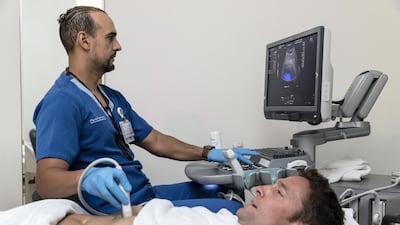Covid-19 has created significant headwinds to the GCC healthcare industry, but once the crisis abates a V-shaped recovery is likely as demand for care soars, according to a new report by Alpen Capital.
Healthcare systems struggled to cope with the surge in demand for Covid-19-related services, which strained their revenue streams as elective and non-urgent surgeries were cancelled, the investment bank said. However, demand for remote services such as telehealth and remote patient monitoring helped to cushion the blow, it added.
This has led to healthcare providers ramping up investments in digitisation to drive future growth. The pandemic has also underlined the need to upgrade existing infrastructure to better prepare for potential future health outbreaks, the report said.
“GCC governments are encouraging the involvement of private players through [the] public-private-partnership model in order to ease the burden of healthcare expenditure amid the economic slowdown,” said Krishna Dhanak, executive director of Alpen Capital. “Consequently, the sector has seen robust merger and acquisition activity over the last two years, specifically in the UAE and Saudi Arabia.”
Investment in the Gulf's healthcare market so far has been driven by governments, with the public sector contributing 75 per cent of the GCC’s 106,500 beds in 2017.
The GCC’s current health expenditure per capita stands at $1,147.80, which is higher than the global average of $1,059, but substantially lower than other developed countries such as the US ($10,000), Germany ($5,000) and the UK ($4,000), the report said. The region also has an average of 5.7 nurses per 1,000 people, which is below the average of developed countries of 8.2 in the UK, 12 in Germany and 15 in the US.
The report highlights a number of areas of investment focus, most notably in acquiring stakes in companies delivering home healthcare and long-term and post-acute care services. These are gaining popularity in the region as a less expensive method for treating older patients, or those with chronic conditions.
Regional governments are also focusing on preventive care to ease the burden on hospitals, the report said.
“Covid-19 has made us take a re-look at business models and service delivery mechanisms and that gives rise to investment opportunities. The shift from treatment towards diagnosis and prevention is important,” said Steve Barnett, executive director of business development at Abu Dhabi Global Market, during a webinar organised by Alpen Capital. “We are seeing new technologies being developed to help make this shift more effective and efficient.”

The growth, and the ageing, of the region's population also presents opportunities for the sector. The GCC’s population is expected to grow at a compound annual rate of 2.3 per cent between 2020 and 2025 while the older population (aged 50+) is expected to grow at a rate of 6.9 per cent, Alpen Capital said.
“Increasing life expectancy at birth, improvements in infant mortality rates and an ageing population are the key demographics expected to drive the region’s healthcare system,” said Sameena Ahmad, managing director at Alpen Capital.
Other growth drivers include the high prevalence of non-communicable diseases (such as diabetes, cardiovascular disease and obesity), the gradual rollout of compulsory health insurance, a strong project pipeline of new facilities (an estimated 161 healthcare projects with a combined value of $53.2bn are under development), and an increase in inbound medical tourism. The GCC medical tourism market is expected to grow at a rate of 8.8 per cent per year to $28bn by the end of 2024, Alpen Capital said.
Meanwhile, some of the main challenges faced by the sector include an economic slowdown and a subsequent reduction in government spending, and a temporary erosion of private sector profits due to weak demand for non-urgent or elective surgeries following Covid-19. The industry also faces a shortage of medical professionals and healthcare institutes. As a result, outbound medical tourism for complex cases has been increasing, the report said.
Healthcare costs are also rising. Gross medical inflation rates ranged between 3.5 per cent and 9.1 per cent in the GCC during 2020, with Saudi Arabia witnessing the highest increase. In the UAE, medical inflation increased to 9 per cent in 2020 from 5.8 per cent in 2018, Alpen Capital estimated.


